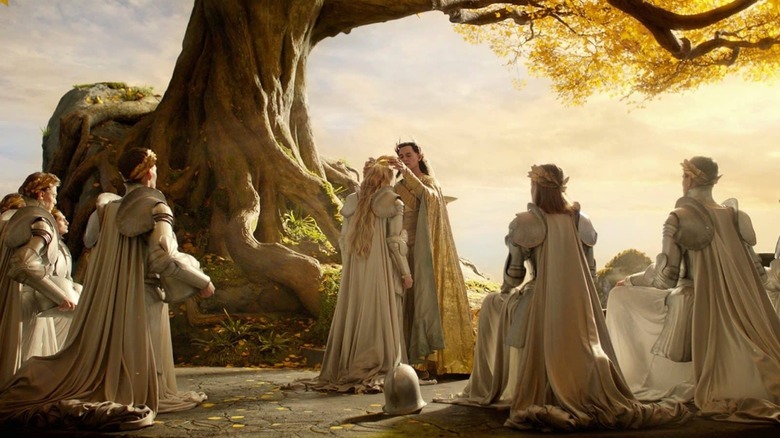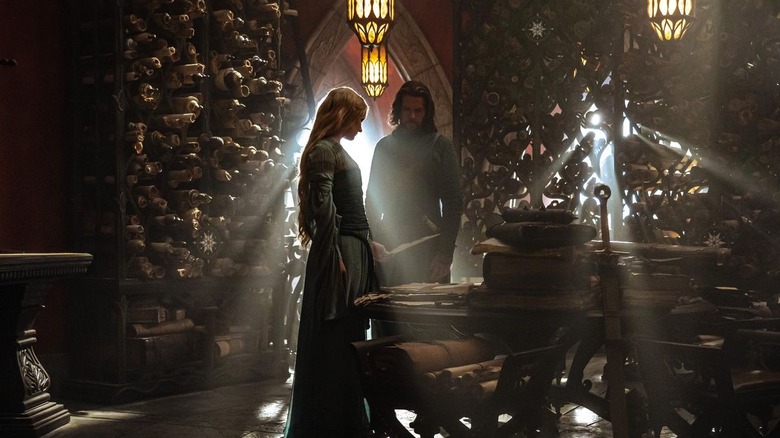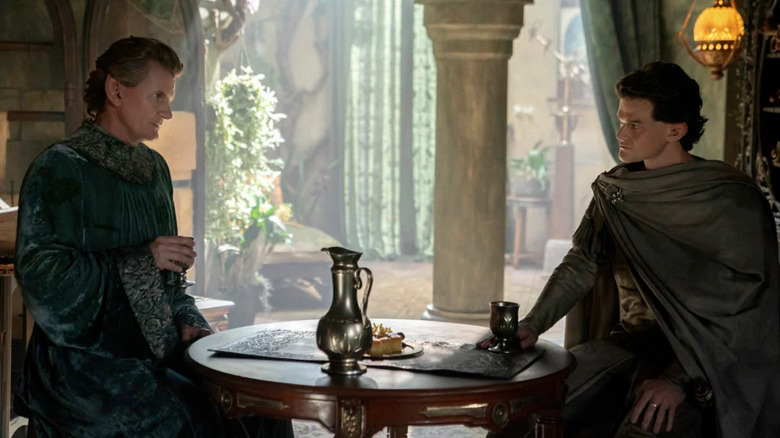A Little Detail In The Rings Of Power Makes Middle-Earth Feel Even More Real [Exclusive]
Spoilers follow for "The Lord of the Rings: The Rings of Power."
Through its epic scope and scale, "The Lord of the Rings: The Rings of Power" achieves never-before-seen cinematic heights on the small screen. A distant relative to Peter Jackson's original trilogy, the streaming series is not afraid of diving head-first into the source material and exploring a rich fantasy world that spans millenniums. Furthermore, the show is able to take advantage of the mega-sized production budget through its groundbreaking visual effects, costumes, and set designs. Every fantastical element feels grounded in reality thanks to the commitment to detail by the artists behind the scenes. One aspect of the show, in particular, speaks to the care put into the vast history "The Rings of Power" covers in its eight-episode season.
The kingdom of Númenor is already a vital location in "The Rings of Power" for several reasons, but one small detail about their culture puts the dense nature of the series in an entirely new perspective. In the third episode, when Galadriel (Morfydd Clark) and Elendil (Lloyd Owen) arrive at the Hall of Lore located on the Númenor island, scrolls — not bound books — are seen throughout the sequence. The scene does not exactly concern itself with that fact, but the background detail plays an important role in laying out the timeline. According to the production designer, this choice was not only intentional but started as an early idea during the development process.
The Númenorians were ahead of their time
For the uninitiated, the Hall of Lore was created by the elves and later kept intact by the previous king — Queen Miriel's (Cynthia Addai-Robinson) father — Tar-Palantir. He admired the elves and their contributions to Númenor, ensuring the scrolls they left behind were safe from those who despised the race. However, if you look closely at the Hall of Lore, you can see bound books lying around, separate from the bevy of scrolls organized in the room. It implies that bookbinding was not a gift by the elves, and instead a creation by the humans who inhabit Númenor.
/Film's Vanessa Armstrong interviewed production designer Ramsey Avery, who revealed just how intentional and detailed his work was from the start:
"One of the decisions that I sold the showrunners on early is that elves didn't have bound books — they didn't invent book binding. We know that Elrond has books in the Third Age, but that doesn't mean that they had books in the Second Age. So, I wanted to tell the story that Númenorians invented book binding, and that this storage of older information, everything would have to be scrolls. I looked at a bunch of Tibetan storage, because of the scrolls, and I thought, 'Wow, that's really cool because now we can have this whole space that's filled with scrolls.'"
The creative detail exemplifies how the kingdom of Númenor continued to advance despite its isolation from Middle-earth. Moreover, "The Rings of Power" confirms that despite the vast intelligence the elves have to offer, they still have not evolved very much in that regard.
The elves are still behind
In the second episode, Elrond (Robert Aramayo) visits Celebrimbor (Charles Edwards) in his workplace to discuss plans to create a very powerful forge. The place is covered in loose scrolls, with not a single bound book in sight. The elves have books by the Third Age, as seen in the original trilogy, but they are still rolling up wrinkly pieces of paper in "The Rings of Power" (get dunked on by humans, elves).
The attention to continuity is impressive even by "The Lord of the Rings" standards, but the real showstopper is the intention to tell a story even in the minute details. Narrative drives every creative decision in the streaming series, and showing the difference between elves and humans in such a simple manner may be one of their brightest. As long as "The Lord of the Rings: The Rings of Power" continues to impress, I'd argue the series will stand the test of time as a passionate exploration of J.R.R. Tolkien's work worthy of the title.


